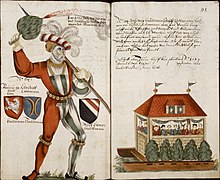Landlord of Altenthann and Weiherhaus
The landlords of Altenthann and Weiherhaus (also: landlords of Altenthann and Weyerhaus ) are one of the oldest patrician families of the Free Imperial City of Nuremberg , first mentioned in 1265. The landlords were from 1340, with short interruptions, until the end of the imperial city period 1806, represented in the "Inner Council" and, according to the " Dance Statute ", belonged to the twenty old genders eligible for advice.
The Weiherhaus mansion, acquired in 1472, and the Nuremberg Glockenhof , acquired in 1765, are still owned by the family foundation established in 1857 .
history
The origin of the landlord can probably be traced back to an imperial ministerial family in the Nuremberg area. They owned the Aischgrund early on . Since 1340 they have belonged to the Nuremberg patriciate .
The landlords achieved prosperity through long-distance trade in cloths from Flanders ( Tournai ) and with money and loan transactions for the Wittelsbachers . Over the centuries, they were involved in the Mendel and Behaim trading transactions and had business contacts with the Stromer trading company and the Rummel .
Later, when many patrician families, following the example of the nobility, added place names to their family names, the landlords called themselves "von Altenthann und Weiherhaus" after the country estates they had acquired in 1472 and 1535. In 1547 the addition was recognized as a title of nobility. After 1813 they were enrolled as nobles in the Bavarian nobility. The Weiherhaus mansions near Feucht and Glockenhof in Nuremberg are still owned by the landlord family foundation .
Possessions (extract)


The family (currently the Grundherr'schen Family Foundation established in 1857) owns:
- since 1472 the manor Weiherhaus near Feucht
- since 1765 the Glockenhof manor (Glockenhofstrasse 47, in Nuremberg)
Former possessions (extract)
From the 14th century to 1501 and from 1610 to 1853, the Nuremberg parent company was the "House for the Golden Shield" (Schildgasse 23), where the first 23 articles of the Golden Bull were written at the Reichstag from November 1355 to January 1356 .
They also owned:
- the Nuremberg properties at Rathausplatz 4 and Maxplatz 14
- 1342–1836 3 estates and 2 Selden estates in Boxdorf
- 1396–? an imperial fiefdom in Muggenhof
- ? -? Schwaig Castle
- 1435– after 1800 property in Kleingeschaidt
- 1535–? their eponymous lordship Altenthann (with church patronage until 2000)
- 1535–1843 the manor Gauchsmühle (the baroque house built in 1744)
- 1550–1565 Prackenfels Castle
- Malmsbach Castle from 1739–1832
- 1765–1835 the Glockenhof manor, the manor (Glockenhofstraße 47) until today owned by the manorial family foundation
- ? -? the hunting lodge Stettenberg (questionable)
- ? -? a property in Kleinreuth behind the fortress and St. Leonhard
Manor Gauchsmühle
Malmsbach Castle , 1798
Known family members
- Adolf von Grundherr (1848–1908), German painter, draftsman and designer
- Friedrich Karl Alexander Grundherr von Altenthann und Weiherhaus (1818–1908), founder of the company “Grundherr & Hertel, Droguerie und Farbwaren en wholesale”, 1862–1879 assessor at the Nuremberg Commercial Appeal Court, from 1868 market manager, from 1878 director of the Chamber of Commerce and Industry Middle Franconia, from 1880 councilor of commerce, 1884 co-founder of Nürnberger Lebensversicherungs AG
- Karl von Grundherr zu Altenthan and Weyherhaus (1869–1940), Bavarian major general
- Werner von Grundherr zu Altenthann und Weiherhaus (1888–1962), until 1952 ambassador to Greece
Leonhard Grundherr (1563–1624), Richter, Losunger
coat of arms
In red a gold crowned, red-tongued half silver lion.
Landlord epitaph in the Frauenkirche
Coat of arms of Carl Sigmund Ferdinand Grundherr, curator of the Landauer Twelve Brothers Foundation
See also
- Patriciate (Nuremberg)
- History of the city of Nuremberg
- Castles, palaces and mansions in the city of Nuremberg
literature
- Christoph von Imhoff (Hrsg.): Famous Nuremberg from nine centuries. 2nd supplemented and expanded edition. Hofmann, Nuremberg 1989, ISBN 3-87191-088-0 .
- Michael Diefenbacher : landlord of Altenthann and Weiherhaus, patrician family . In: Michael Diefenbacher, Rudolf Endres (Hrsg.): Stadtlexikon Nürnberg . 2nd, improved edition. W. Tümmels Verlag, Nuremberg 2000, ISBN 3-921590-69-8 ( online ).
Web links
Individual evidence
- ↑ Illustration "House of the Golden Shield" (Schildgasse 23)
- ↑ Werner von Grundherr. In: DER SPIEGEL. No. 47 of November 21, 1962, p. 132.
- ↑ Life data: * January 22, 1888 in Nuremberg; † November 8, 1962 in Weissenburg, after: Werner von Grundherr zu Altenthann and Weierhaus in the Munzinger archive ( beginning of article freely available)











